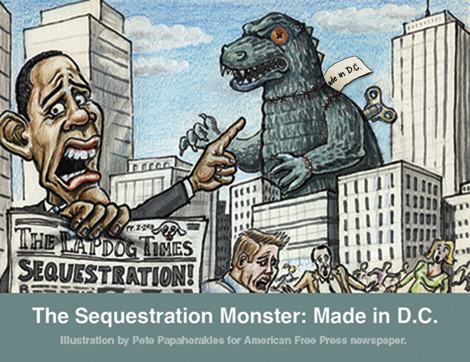
• Administration creates “budget monster”—cuts amount to a drop in the debt bucket
By Keith Johnson
For the past several days, President Obama has been running around like Chicken Little warning that the sky will surely fall unless Congress prevents $85B in government spending cuts from taking effect on March 1.
“Congress is poised to allow a series of arbitrary automatic budget cuts to kick in that will slow our economy, eliminate jobs and leave a lot of folks who are already pretty thinly stretched scrambling to figure out what to do,” said Obama during a recent speech at the White House.
In reality, the panic surrounding sequestration is a manufactured crisis and will likely have no effect on the government programs and services that many Americans—unfortunately —have become dependent on.
Senator Rand Paul (R-Ky.), who has asked fellow congressmen to call Obama’s bluff and let sequestration happen, recently put the so-called cuts in proper perspective. During a recent appearance on CNN, Paul said: “The budgets are not being decreased. . . . We’re talking about cutting the rate of growth of budgets.”
On February 25, the White House released state-by-state reports that detailed which programs and services “could” be affected by the so-called sequestration.
Some of the proposed cuts sound promising: slashing the military budget, ending dangerous vaccine programs and removing a large swath of Transportation Security Administration screeners from United States airports. However, a thorough reading of these wildly provocative documents would lead some to believe that the cuts will ultimately leave our children without schools, patients without hospitals, streets without police and the elderly without food. Those who are familiar with the games played at our nation’s capital, see these threats as nothing more than an act of political theater.
“Government entities, including security agencies, are experts at the Washington budget game and practice the well-known ‘firemen first’ principle,” writes Ivan Eland, director of the Center on Peace and Liberty at the Independent Institute. “When agencies smell budget cuts in the air, they threaten to cut their most essential, popular or politically defensible programs first—for example, money for fighting fires—to dissuade politicians from cutting their budgets.”
Even with the “cuts,” the federal government is still expected to grow by $7-$8T over the course of the next 10 years and is currently twice the size it was 10 years ago. The truth is, sequestration may not go nearly far enough.
Keith Johnson in an investigative journalist and host of the Revolt of the Plebs radio program.


